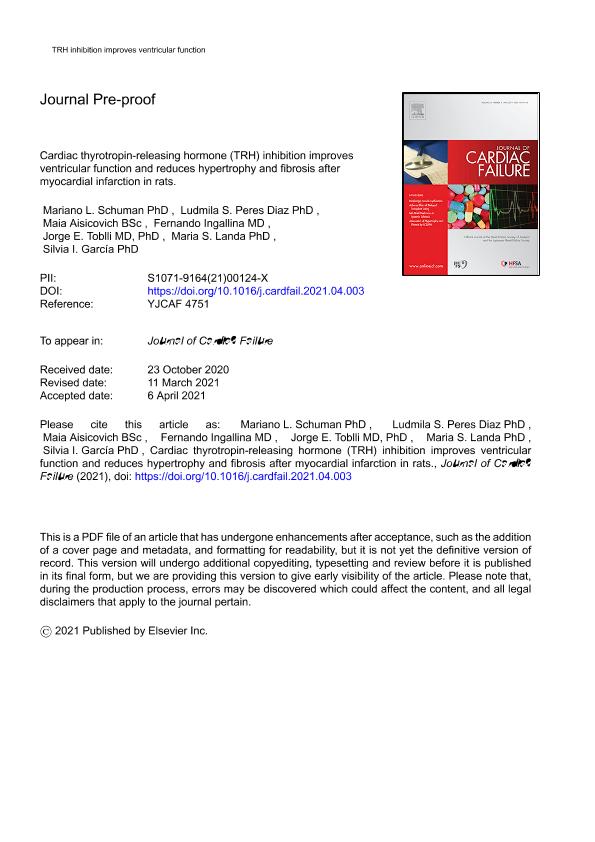Artículo
Cardiac Thyrotropin-releasing Hormone Inhibition Improves Ventricular Function and Reduces Hypertrophy and Fibrosis After Myocardial Infarction in Rats
Schuman, Mariano Luis ; Peres Diaz, Ludmila Soledad
; Peres Diaz, Ludmila Soledad ; Aisicovich, Maia
; Aisicovich, Maia ; Ingallina, Fernando Juan; Toblli, Jorge Eduardo
; Ingallina, Fernando Juan; Toblli, Jorge Eduardo ; Landa, Maria Silvina
; Landa, Maria Silvina ; Garcia, Silvia Ines
; Garcia, Silvia Ines
 ; Peres Diaz, Ludmila Soledad
; Peres Diaz, Ludmila Soledad ; Aisicovich, Maia
; Aisicovich, Maia ; Ingallina, Fernando Juan; Toblli, Jorge Eduardo
; Ingallina, Fernando Juan; Toblli, Jorge Eduardo ; Landa, Maria Silvina
; Landa, Maria Silvina ; Garcia, Silvia Ines
; Garcia, Silvia Ines
Fecha de publicación:
07/2021
Editorial:
Churchill Livingstone Inc Medical Publishers
Revista:
Journal Of Cardiac Failure
ISSN:
1071-9164
Idioma:
Inglés
Tipo de recurso:
Artículo publicado
Clasificación temática:
Resumen
Background: Cardiac thyrotropin-releasing hormone (TRH) is a tripeptide with still unknown functions. We demonstrated that the left ventricle (LV) TRH system is hyperactivated in spontaneously hypertensive rats and its inhibition prevented cardiac hypertrophy and fibrosis. Therefore, we evaluated whether in vivo cardiac TRH inhibition could improve myocardial function and attenuate ventricular remodeling in a rat model of myocardial infarction (MI). Methods and Results: In Wistar rats, MI was induced by a permanent left anterior descending coronary artery ligation. A coronary injection of a specific small interfering RNA against TRH was applied simultaneously. The control group received a scrambled small interfering RNA. Cardiac remodeling variables were evaluated one week later. In MI rats, TRH inhibition decreased LV end-diastolic (1.049 ± 0.102 mL vs 1.339 ± 0.102 mL, P <.05), and end-systolic volumes (0.282 ± 0.043 mL vs 0.515 ± 0.037 mL, P <.001), and increased LV ejection fraction (71.89 ± 2.80% vs 65.69 ± 2.85%, P <.05). Although both MI groups presented similar infarct size, small interfering RNA against TRH treatment attenuated the cardiac hypertrophy index and myocardial interstitial collagen deposition in the peri-infarct myocardium. These effects were accompanied by attenuation in the rise of transforming growth factor-β, collagen I, and collagen III, as well as the fetal genes (atrial natriuretic peptide, B-type natriuretic peptide, and beta myosin heavy chain) expression in the peri-infarct region. In addition, the expression of Hif1α and vascular endothelial growth factor significantly increased compared with all groups. Conclusions: Cardiac TRH inhibition improves LV systolic function and attenuates ventricular remodeling after MI. These novel findings support the idea that TRH inhibition may serve as a new therapeutic strategy against the progression of heart failure.
Archivos asociados
Licencia
Identificadores
Colecciones
Articulos(IDIM)
Articulos de INST.DE INVEST.MEDICAS
Articulos de INST.DE INVEST.MEDICAS
Citación
Schuman, Mariano Luis; Peres Diaz, Ludmila Soledad; Aisicovich, Maia; Ingallina, Fernando Juan; Toblli, Jorge Eduardo; et al.; Cardiac Thyrotropin-releasing Hormone Inhibition Improves Ventricular Function and Reduces Hypertrophy and Fibrosis After Myocardial Infarction in Rats; Churchill Livingstone Inc Medical Publishers; Journal Of Cardiac Failure; 27; 7; 7-2021; 796-807
Compartir
Altmétricas



